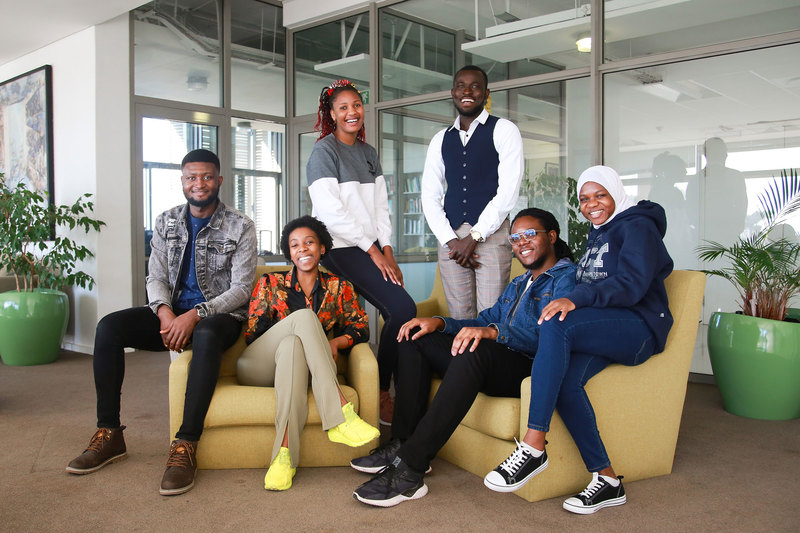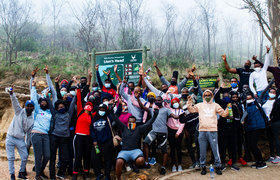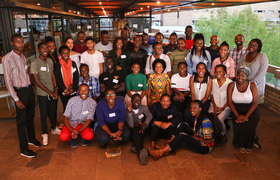Tributes to ‘life-changing’ Mastercard Foundation Scholars Program
01 August 2022 | Story Helen Swingler. Photo Je’nine May. Read time 10 min.
“I am grateful for how far you have brought me and other like-minded youths in Africa … for your generous support that is helping us realise our dreams … for the leadership skills you have instilled in many of us – and the heart of giving back.”
Sharifa Negesa’s words captured the messages of goodwill from fellow University of Cape Town (UCT) participants in the Mastercard Foundation Scholars Program (MCFSP) on the 10th year of this life-changing programme. UCT is one of several South African partner universities.
The MCFSP launched in 2012 with six university partners and a first cohort of 145 scholars. In only a decade it has changed the trajectory of over 40 000 young Africans, with ripple effects across the continent. Many other Mastercard Foundation Scholars in other countries around the world have also benefited.
Holistic support
Scholars receive financial support as well as mentoring, leadership development, and academic and life skills support.
A Ugandan, Negesa is enrolled for a master’s in computer science at UCT, her focus on ICT4D in health, specifically maternal health.
The MCFSP is now the largest initiative of its kind worldwide. Their partner network includes 40 higher education institutions and NGOs – and more than half are African. UCT welcomed its first cohort of 19 scholars in the 2015 academic year. Two hundred and nine UCT students have benefitted from the MCFSP thus far.
The 10-year milestone was noted at UCT during the foundation’s recent visit to the campus. This was also an opportunity for delegates to meet some of the Mastercard Foundation Scholars on campus. The delegation also met with Vice-Chancellor Professor Mamokgethi Phakeng, who is an enthusiastic supporter of the initiative and its work.
‘Shaped my leadership skills’
Negesa said that the programme has opened the doors to “one of the best institutions in Africa”. She has participated in the MCFSP for the past seven years and has been shaped as a leader.
“The mentorship programme has enabled me to self-actualise what I want to be. I’ve been able to learn, unlearn and relearn from my fellow peers and mentors.
“I am grateful for how far you have brought me and other like-minded youths in Africa.”
She added, “The Mastercard Foundation’s ethos is to give back … I’m a volunteer with Girls Alive Uganda. We go into communities to teach girls about menstrual hygiene and how to make sanitary pads.”
This has helped keep girls in school.
To the Mastercard Foundation, she said: “I am grateful for how far you have brought me and other like-minded youths in Africa. We are grateful for your generous support that is helping us realise our dreams. Thank you for the leadership skills you have instilled in many of us, and the heart of giving back.”
Unprecedented impact
“My family’s financial constraints almost shut [down] my dreams,” said Mastercard Foundation Scholar Bright Tetteh, a Ghanaian master’s student in economic sciences.
But the MCFSP changed that.
“The programme is 10 years old but the impact it has made is unprecedented.”
“The programme is 10 years old but the impact it has made is unprecedented,” he said. “Young Africans are ambitious, courageous and skilful, but they lack the opportunity to achieve their goals and transform their communities.”
Tetteh is also the co-founder of the Learn a Skill community-based project in Ghana. This provides financial and emotional support to young Ghanaian girls who have dropped out of school, helping them learn vocational skills and earn a living.
The first in his family to finish high school and attend university, Tetteh came to UCT with a big plan. After his MPhil he aims to enrol for a PhD at UCT.
To the Mastercard Foundation, he said, “Do not stop the good work, for any reason. Young Africans need you!”
‘Best journey of my life’
Zimbabwean economics and finance student Gamuchirayi Manyadzi endorsed this.
“Coming to UCT has to be the best journey in my life.”
“On behalf of the thousands of lives you have changed out there: Thank you.”
Participating in the MCFSP’s mentorship programmes and leadership workshops – and seeing fellow scholars fly – has changed her profoundly, Manyadzi said.
“I have also grown as a young woman as I have been exposed to the world and witnessed so many possibilities and opportunities [open up] to women who work hard – and I aspire to be like that.”
Next up is a postgraduate degree in her field. She is also committed to community development through her work with NPOs such as The Voice of the Girl Child Trust. This teaches vulnerable girls and young women, especially those living in rural areas, about their human rights.
In her message to the foundation, she said, “On behalf of the thousands of lives you have changed out there: Thank you … as a Mastercard Foundation Ambassador, I shall continue to raise the Mastercard Foundation’s flag and take Africa to greater heights.”
Transforming the mind
Simamkele Dingiswayo is from the Eastern Cape. She wanted more than the “job security as a domestic worker or gardener in the nearby affluent cities [that] has been and continues to be a defining criterion of success”.
“It dawned on me that what we need is a transformation of the mind, a way to free ourselves from the grasp of inequality,” she said.
Now a master’s student in public health, Dingiswayo is passionate about protecting and improving public and community health. She has a keen interest in healthcare disparities in rural areas.
“I’ve also been able to meet like-minded scholars across Africa.”
Support from the MCFSP has enabled her to fulfil her dreams, she said.
“I’ve also been able to meet like-minded scholars across Africa, a valuable opportunity for a horizontal exchange of knowledge … the foundation has enabled me to gain a unique insight into how other African students study, work and live.”
She has her sights set on a PhD in global health or health sociology, which examines the availability and accessibility of maternal care services in rural South Africa.
On the programme’s milestone, she said, “I have not only been given the opportunity to further my studies and achieve my dreams, but also been reintroduced to the spirit of true Africanism, which has led me to proclaim with pride and confidence that iAfrika ibuyile [Africa is back].”
Eradicate malnutrition
With its record of excellence in and outside Africa, UCT was among Nigerian student Iyanuoluwa Oyetunji’s top study choices. And being selected for the MCFSP has given him an education he would not have been able to afford, said the master’s student in human nutrition.
“I have been able to extend access to opportunities such as this to several other young people in my network.”
“This opportunity has also had ripple effects on members of my immediate family and network back at home. I have been able to extend access to opportunities such as this to several other young people in my network.”
Next up is a PhD, with the aim of a significant contribution to eliminating malnutrition among at-risk populations in Africa and beyond.
“I want to assure the Mastercard Foundation that we will continue to exemplify their core values wherever we go, and we will together make Africa and the world a better place.”
Databanks to policy
After graduating with a degree in forensic science at the University of Zimbabwe, Simbarashe Knox Kaneunyenye worked for a wildlife trust, “databanking DNA” to track animals threatened by poachers across the Kavango Zambezi Transfrontier Conservation Area region.
But he wanted to learn more about the processes behind the policies that regulate trans-national crimes such as poaching. Kaneunyenye is now in the final year of a master’s, which examines the impact of crime on the city’s vulnerable migrant communities.
He plans to use his skills at a regional level.
“The formation of the Africa Continental Free Trade Area is a long overdue project, and I am excited to find ways to contribute to the security policies and research that will define and develop it.”
“The foundation has helped me every step of the way, especially with my research.”
Without the Mastercard Foundation’s help, he would not have been able to attend “the best university in Africa” to learn about policy work.
“The foundation has helped me every step of the way, especially with my research … and all the costs of that process.”
To the foundation, he said, “Congratulations to all the people who have had the chance to be associated with this prestigious programme. Thanks to the first cohort of scholars. I stand on the shoulders of the scholars who came before me who did such a great job. Without those pioneers and think tanks, I would not be here.”
 This work is licensed under a Creative Commons Attribution-NoDerivatives 4.0 International License.
This work is licensed under a Creative Commons Attribution-NoDerivatives 4.0 International License.
Please view the republishing articles page for more information.










